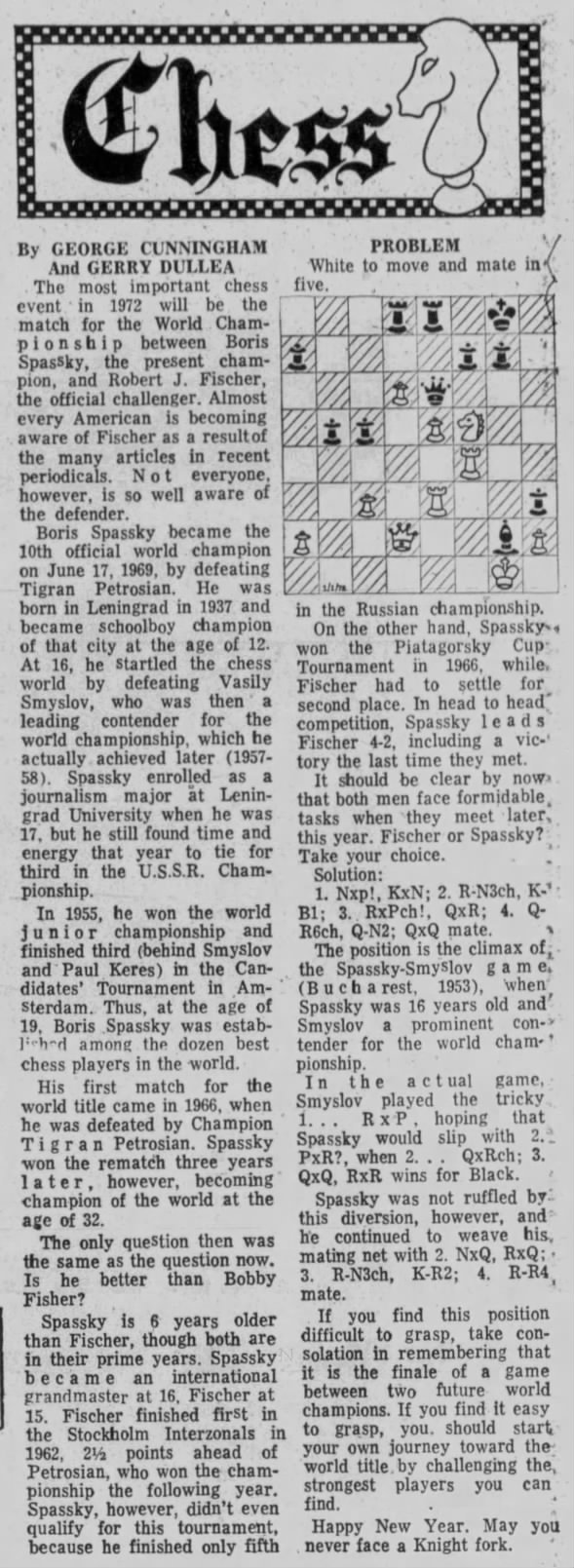< Prev Index Next >
 Chess Sun, Jan 2, 1972 – 11 · The Bangor Daily News (Bangor, Maine) · Newspapers.com
Chess Sun, Jan 2, 1972 – 11 · The Bangor Daily News (Bangor, Maine) · Newspapers.com
Chess by George Cunningham and Gerry Dullea
The most important chess event in 1972 will be the match for the World Championship between Boris Spassky, the present champion, and Robert J. Fischer, the official challenger. Almost every American is becoming aware of Fischer as a result of the many articles in recent periodicals. Not everyone, however, is so well aware of the defender.
Boris Spassky became the 10th official world champion on June 17, 1969, by defeating Tigran Petrosian. He was born in Leningrad in 1937 and became schoolboy champion of that city at the age of 12. At 16, he started the chess world by defeating Vassily Smyslov, who was then a leading contender for the world championship, which he actually achieved later (1957-58). Spassky enrolled as a journalism major at Leningrad University when he was 17, but he still found time and energy that year to tie for third in the U.S.S.R. Championship.
In 1955, he won the world junior championship and finished third (behind Smyslov and Paul Keres) in the Candidates' Tournament in Amsterdam. Thus, at the age of 19, Boris Spassky was established among the dozen best chess players in the world.
His first match for the world title came in 1966, when he was defeated by Champion Tigran Petrosian. Spassky won the rematch three years later, however, becoming champion of the world at the age of 32.
The only question then was the same as the question now. Is he better than Bobby Fischer?
Spassky is 6 years older than Fischer, though both are in their prime years. Spassky became an international grandmaster at 16. Fischer at 15. Fischer finished first in the Stockholm Interzonals in 1962, 2½ points ahead of Petrosian, who won the championship the following year. Spassky, however, didn't even qualify for this tournament, because he finished only fifth in the Russian championship.
On the other hand, Spassky won the Piatigorsky Cup Tournament in 1966, while Fischer had to settle for second place. In head to head competition, Spassky leads Fischer 4-2, including a victory the last time they met.
It should be clear by now that both men face formidable tasks when they meet later this year. Fischer or Spassky? Take your choice.
Solution:
1. NxP! KxN; 2. R-N3ch K-B1; 3. RxPch! QxR; 4. Q-R6ch Q-N2; QxQ mate.
The position is the climax of the Spassky-Smyslov game (Bucharest, 1953), when Spassky was 16 years old and Smyslov a prominent contender for the world championship.
In the actual game, Smyslov played the tricky 1. … RxP hoping that Spassky would slip with 2. PxR? when 2. … QxRch; 3. QxQ RxR wins for Black.
Spassky was not ruffled by this diversion, however, and he continued to weave his mating net with 2. NxQ RxQ; 3. R-N3ch K-R2; 4. R-R4 mate.






















